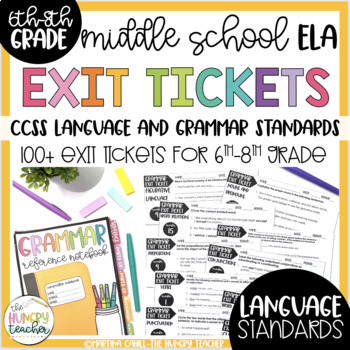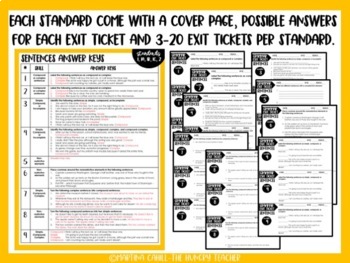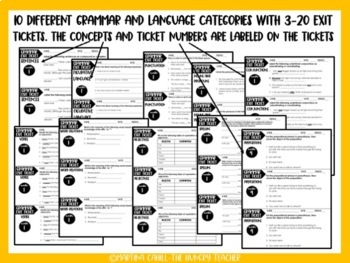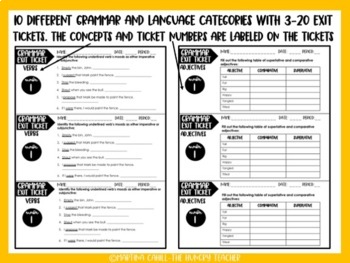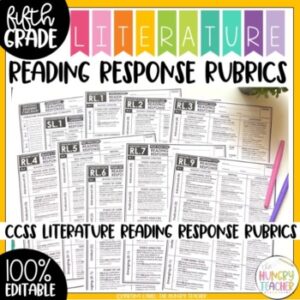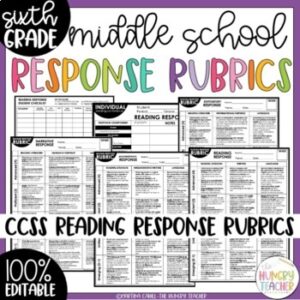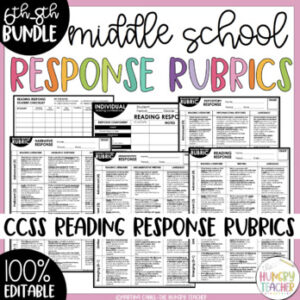Description
Download a preview <<HERE>>
-
102+ Grammar and Language Exit Tickets with three exit tickets per page
-
Answer keys for EVERY single exit ticket
-
6th, 7th, and 8th Grade Common Core Language Standards
-
3-20 exit tickets for each CCSS language standard
-
Sentences (9 tickets)
-
Clauses (3 tickets)
-
Figurative Language (10 tickets)
-
Punctuation (17 tickets)
-
Nouns and Pronouns (12 tickets)
-
Conjunctions (3 tickets)
-
Verbs (15 tickets)
-
Word Relations (20 tickets)
-
Adjectives (6 tickets)
-
Spelling (2 tickets)
-
Prepositions (4 tickets)
-
Parts of Speech
-
Simple Sentences
-
Complex Sentences
-
Compound Sentences
-
Compound-Complex Sentences
-
Independent and Dependent Clauses
-
Figurative Language: Hyperboles
-
Types of Phrases
-
Absolute Phrases
-
Appositive Phrases
-
Gerund Phrases
-
Infinite Phrases
-
Noun Phrases
-
Participle Phrases
-
Prepositional Phrase
-
Colons and Semicolons
-
Types of Pronouns
-
Possessive Pronouns
-
Reflexive Pronouns
-
Reciprocal Pronouns
-
Demonstrative Pronouns
-
Interrogative Pronouns
-
Indefinite Pronouns
-
Subordinating Conjunctions
-
Coordinating Conjunctions
-
Using Quotation Marks Correctly
-
Verb Moods
-
Indicative Verb Mood
-
Imperative Verb Mood
-
Interrogative Verb Mood
-
Conditional Verb Mood
-
Subjunctive Verb Mood
-
Figurative Language: Personification
-
Common Prefixes and their Meanings
-
Using Context Clues to determine word meanings
-
Connotation and Denotation
-
Infinitive Verbs
-
Present Participle Verbs
-
Past Participle Verbs
-
Past Tense Verbs
-
Common and Proper Nouns
-
Common Homophones
-
Intensive Pronouns
-
Vague Pronouns
-
Direct Objects
-
Indirect Objects
-
Object of the Preposition
-
Figurative Language: Metaphor
-
Figurative Language: Simile
-
Punctuation Nonrestrictive Elements
-
Author Style and Tone
-
Comparative Adjective
-
Superlative Adjectives
-
Benefits of using the four different type of sentence structure (variety)
-
Proper noun Rules
-
Dangling Modifier Rules
-
Expressing Ideas Precisely and eliminating wordiness and redundancy
-
Plural Noun Rules
-
Verbals
-
Gerunds
-
Infinitives
-
Past and Present Participle
-
Abstract Nouns
-
Concrete Nouns
-
Punctuating and Capitalizing Titles of Works
-
Subjects and Predicates
-
Simple Subjects and Predicates
-
Compound Subjects and Predicates
-
Verb Tenses (12 Different Verb Tenses)
-
Action Verbs
-
Linking Verbs
-
Helping Verbs
-
Figurative Language: Allusion
-
Rules for Using Numbers in English
-
Rules for Using Apostrophes in English
-
Rules for Using Commas in English
-
Prepositions and Prepositional Phrases
-
Direct Objects
-
Indirect Objects
-
Object of the Preposition
-
Commonly Confused Words
-
Situational Irony
-
Dramatic Irony
-
Verbal Irony
-
Active Verbs
-
Passive Verbs
-
Imperative Sentences
-
Exclamatory Sentences
-
Interrogative Sentences
-
Declarative Sentences
-
Descriptive Adjective
-
Quantitative Adjectives
-
Demonstrative Adjectives
-
Possessive Adjectives
-
Distributive Adjectives
-
Interrogative Adjectives
-
Articles (Adjectives)
-
Antonyms
-
Synonyms
-
Figurative Language: Idioms
-
Differences between Who and Whom
